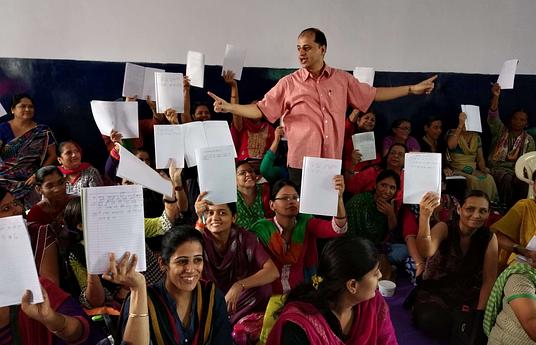Innovators from India, Israel and the USA took to the stage on the final day of the HundrED Summit to share the types of things educators and schools can do to protect teacher wellbeing. Watch the video to see the talk in full.
Creativity
What is an activity you’ll do in the classroom 200 or more times this year? It could be taking attendance, for example. Now think of a more creative way you could approach that task. Perhaps it’s singing the names, going last to first, turning it into a rhyme, making it a game. You don’t need to dedicate any extra time, just do it differently each day. Focus on this, and the outcome is a much more flexible approach to learning all over the classroom. This is the idea of Eyal Doron, founder of SeiSei Learning.
“Trying to prepare children for the changing world of the 21st century, it’s clear we need to reinvent ourselves and the profession, and to do that we have to be creative.”
Doron urges us to look for mentors online, famous people we can model ourselves on or take inspiration from. “We are all one click away from a great mentor, so why not do that?”
Great teaching is like great storytelling, he reminds us. Every lesson should have a beautiful beginning and a moment to remember, other than that, it doesn’t matter too much what happens and you can be creative. So, before walking into class, ask yourself “Does this lesson have a moment to remember?”
And finally, Doron reassures us that we don’t always have to be so serious, we can take away some of the pressure and approach things in a more creative way. “Try to be less predictable, less rational, less responsible all the time. Could you try teaching without something – whether that be books, tables, homework, or preparation?”
Relationships
“Who are the five people you spending your most time with?”, asks Kayla Delzer. “You are taking on those characteristics. And vice versa, you are actually shaping the people you spend around.”
“As a teacher, it’s so important to surround ourselves with people who challenge us, but also help us grow”
“In this room, we have a lot of hand clapping and a huge circle of people lifting each other up and sharing our ideas around the world. I’m so thankful for that. We know that in our countries and classrooms, it’s not always like that. But we get that here, that collaboration is more important than competition in education. We are all on the same team: team kid”.
“I encourage every teacher and innovator to have a professional learning network (PLN) in 2019. A PLN is comprised of three things: education friends, information and social media. In 2019, if you’re feeling isolated as a teacher, that is a choice you are making. It’s so easy to be connected now.”
“In education around the world we’re facing a real teacher shortage, in the US we have less than 3% of incoming freshman college students considering a career in teaching.
So it really comes down to me telling the people that have kept me going, thank you. So often we only hear the horror stories and what’s going wrong, so it’s up to us to share what’s going right too.”
“More than ever with teachers it’s important to surround yourself with the right people – if your circle isn’t clapping when something good happens to you, and they’re not supporting your crazy innovative ideas, then you need to get another circle.”
Wellbeing
SMILES in Education enables students and teachers to make the classroom a calming, re-energizing space.
“A teacher isn’t only a person who teaches, they are also a coach, mentor, parent, nurse, friend, leader, and so much more,” Vishal Sharma reminds us. “There are so many roles a teacher plays, so we need to protect their wellbeing”
“Wellbeing is a state of being comfortable, healthy and happy. It looks very simple, but do we place emphasis on this?”
SMILES incorporates mindfulness into everything we do in the classroom. There’s a focus on the body – with mindful breathing, eating, and healing. Then there’s the brain or mental wellbeing. This includes mindful time-management, mindful decision making and mindful brain activation. And finally, a focus on behavior, because our emotions are reflected in our behavior. This includes mindful control of emotions, mindful acceptance and mindful sharing. Watch the video to see some of the easy and effective tools in action!
Like what you've heard so far? Find a playlist of videos from the HundrED Summit here.




